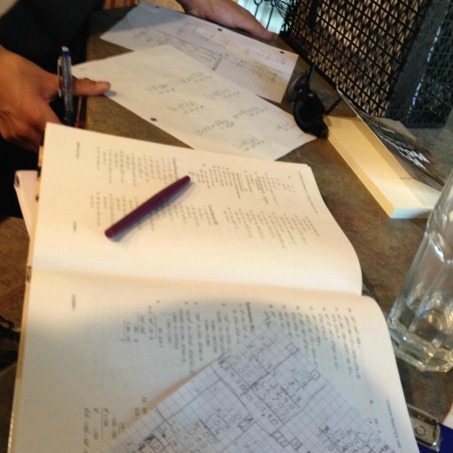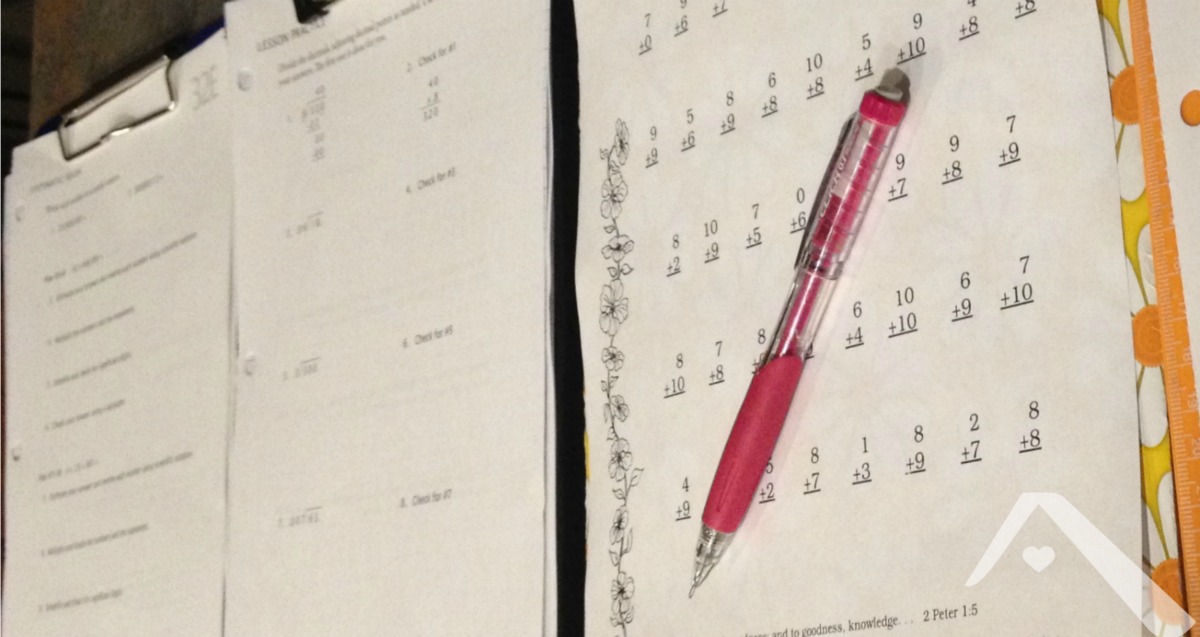If you’ve homeschooled for any length of time, you’ve probably encountered them: math fits.

On good days, it looks like mad math doodles and rhyming complaints. On average days, it looks like snarky word-answers to word-problems and bitter mutterings about John or Sue finding out how much they spent for themselves instead of asking someone else to do their work for them.
Sure, we have good math days, too. Sometimes we even encounter a new topic, it clicks, and we breeze on through.
However, it’s not only the fact that I have four math students or the fact that three of them are double-digits in age (and encountering the horror of letters in their math). The truth of the matter is that math is doing its best work when it stretches our minds and pushes our abilities beyond the comfort zone.
Few of us enjoy being pushed, stretched, or challenged. By definition, it is uncomfortable.
That’s why your math program is the best character-development curriculum you can find.
Math teaches us not only about the functions and relationships of numbers, it also teaches us how to handle our own inadequacies, how to admit a mistake and correct it, and how to rise to a challenge and persevere.
So far every one of my students, by the time they hit they’re eight or nine (or hit long division at 10 or 11), start hitting rough patches with math. These intensify when math challenges coincide with bodily changes (i.e. 12). When they are old enough to feel that their right to liberty and happiness (a perceived right, anyway), they are old enough to be grieved by, or even insulted by, tricky math questions.
Maybe the child didn’t get enough sleep the night before, so they’re grouchy and stubborn. Maybe they don’t understand the concept and they’ve decided they don’t want to understand the concept. Maybe they tried and have resolved that if at first you don’t succeed, then you never will.
Maybe as the teacher, I took a wrong tactic, and now they’re in tears.
Through the ups and downs of years of math in our homeschool, I’ve clung to Cindy Rollins’ advice to be impervious and Elizabeth Krueger’s advice to outlast. They are right: it is the calm brick wall that best breaks the waves of emotional turmoil.

If (or when) you’re facing such waves, here are three principles to keep in your back pocket:
Find the source of stress.
The tears are a symptom, and generally the cause of the tears is stress. Find the stress and you can address (and understand) the tears. It might look like the math is causing the tears, but often it actually isn’t.
Dig for the cause. Wait for the cause. The tears are often not because the math is actually too hard, even if that’s what they say and what they believe.
Some of the reasons for math tears I have encountered have been
- inadequate sleep
- growth/hormone spurt causing out-of-whack emotions
- fear of not finishing on time
- fear of losing computer time if the answer is wrong again
- belief that the confusion is permanent
- belief they will never understand
- fear of having no free time
- dread
I’m sure there have been others I’m forgetting now. In the comments, share what causes you’ve uncovered in your home.
The tears are emotions holding sway over the reason. While the stress and the tears hold, clear thinking is impossible. Help them get over the emotional hurdle before tutoring the math equations.
Hold on.
Be on their team, not the opposition. They have enough opponents: their emotions, their fear, their brain freezes, their body changes.
Andrew Kern once said of math-haters that the truth is not that we hate math, but that we hate not knowing math. We hate getting the wrong answer and we are too impatient to learn what we must to get the answer right.
Have you ever given up on something after a first try? It’s always a temptation. Math provides this temptation often, maybe even every day. Remember: your child is learning not only mathematics, but also character.
Whenever he sticks with the problem, returning until it’s correct, he’s practicing perseverance, courage, and grit – even if it’s practice under duress. Sometimes, that’s where we all begin.
It is hard. It is a struggle beyond the equation. The triumph at the end of the struggle (no matter how long it takes) is worth it.
Hold on to them while also holding the line.

Know when to pause.
Holding on and teaching perseverance does not mean that we keep our child in the chair until they get it right.
We are teaching them how to cope with their emotions and rule their choices with their heads, not their feelings. It can’t be forced; it is the activity of the child himself.
As the mother-teacher, it is easy to make it much harder for them to do so. When we pile on our emotions of frustration on top of their own, we suffocate them. When we turn on the heat, we add stress and increase the mental shut-down.
Our job in these situations is to ensure that giving in to feelings never gets them out of their work in the end – it shouldn’t be rewarding – but also that we teach them coping strategies that actually work (even for us – can we take our own advice?)
When the emotions are too hot to think clearly, stop. Take a walk. Jump on the trampoline. Get a drink of water. Do piano practice instead and come back to math later. At the very least, stretch, take some deep breaths, and state the problem calmly. Until there is calm, there is no clear thinking. Without clear thinking, there is no math progress.
Sometimes we truly do find that they have hit a math wall they cannot overleap. The concept baffles them. The basics are so rusty that silly errors throw them off every time. Maybe the approach makes no sense and they have built up an antipathy you can’t get over right now.
It’s ok to push pause, also, so long as it’s your calm call as the teacher and not a giving in to their frustrations. Do Khan Academy or xtramath or Calculadder review. Find extra practice pages on the internet to print. Take a break week.
Breaks are good for progress. Just like land needs to lie fallow to be more productive later, growing and development happens in the quiet spaces, too. Don’t fear that the looming Spring Break, summer vacation, or Christmas break will make things even worse. Do not try to use that time to “catch up” because they’ve been obstinate in math. Breaks can be a perfect emotional reset time, so you can return with a clear mind and a refreshed attitude – both you and your child.
Homeschooling takes wisdom. There are no cookie-cutter answers that will work every time, with every child. Instead, you have to pay attention, be faithful to love (love is not irritable or resentful and does not insist on its own way). Yes, homeschooling and parenting are intertwined. We must parent our children even in the midst of a math lesson.
Curious about whether or not you need break weeks? We have had a 6-weeks-on, 1-week-off, with December and June entirely off for 10 years. Join me for a live Q&A chat and learn how we make it work and why I love it.

“Our job in these situations is to ensure that giving in to feelings never gets them out of their work in the end – it shouldn’t be rewarding – but also that we teach them coping strategies that actually work” — so so wise!
I really appreciate this post and I’ll be sharing it. :-)
Thanks, Mary!
Thanks, Misty. I was getting suspicious of (ack! ) puberty on the horizon for my sweet 9.5 year old. As in….is this part of why emotional stress is seeming to mount and Math progress is slowing down? So just reading this puts me a bit more at ease. And I need so badly to be open to God’s grace to keep me steady and calm. So thank you for the post. Very good stuff!
Thanks for sharing this. I have a Math-loving preteen. And a “math is the worst”, about-to-be preteen. I am consistently more patient with him every day, then any of our others with Math. But I know it’s deeper then just not knowing how to do the same math problems. This post was very helpful for me to take a step back and reevaluate.